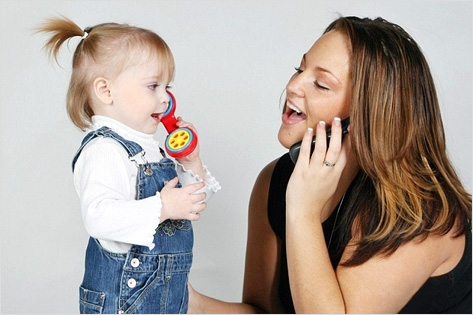Every parent, when his child grows up, waits for the child to start talking. First of all, we should not forget that every child — personality, it develops according to its own special "schedule". Waiting for the first words can last for months, but when the baby is silent for up to two or three years, parents begin to worry and urgently sound the alarm.
The editors of estet-portal decided to find the main reasons why the child does not speak and how you can speed up the development of your baby's speech.
- Specialists identify generally accepted norms for the development of children's speech
- Reasons why the child does not want to talk
- What to do to make the child begins to talk
Specialists identify generally accepted norms for the development of children's speech
1-2 months Cry. In this way, we can determine the specific emotion that the child is experiencing.
1.5-3 months Syllables. The baby begins to repeat individual sounds after you.
4-5 months Short, simple words. It is the period when the child begins to say "mom", "woman", "dad", and other words that are easy to pronounce.
Subscribe to our page on Facebook!

8 – 14 months Vocabulary expands, child can repeat more complex sounds and words.
A year and a half - 2 years 2 months Child can speak in short two-word phrases.
1 year 9 months - 2 years 6 months The child begins to actively learn new words, names of various objects.
2 years 4 months - 3 years 6 months The baby can already make understandable correct sentences. Learns to pronounce the letter "R".
2 years 6 months - 3 years 5 months Flight of fancy. The child creates his own words, based on knowledge of his native language. Comments on their actions.
Reasons why the child does not want to talk
The reasons why a child is silent can be completely different. Various factors influence this.
Bilingual children - how to learn a foreign language
Let's name the main reasons:
1. Genetics. Ask your parents when they heard your first words. Maybe that's why your child is also in no hurry to speak.
2. The child does not see the need. "They understand me anyway, why should I speak?".
3. The parents are silent. The baby at birth should be surrounded by speech. It's not easy to hear someone talking to someone. You need to communicate with the child, tell him something.
4. Stress. If a child is frightened of something, or constantly becomes a witness to parental quarrels or negativity, this can affect the development of more than just speech.
5. Stubbornness. If everyone is trying hard to get the child to talk, he may simply protest. It also depends on the nature of the baby.
6. Bilingual family. If you and your husband speak different languages, and communicate with your child in different ways, he can just get confused.
6. Complication during pregnancy or childbirth of the mother.
7. Hearing loss, speech apparatus or problems of intellectual development. Such deviations will be determined by doctors.
What to do to make the child start talking
If your baby's speech development has not been diagnosed by doctors and he just doesn't want to talk, there are various exercises that can help your baby start to communicate.

1. Read.Read the rhyme to your child regularly and ask him to help you complete the sentence.
2. Speak with expression. When you talk about everyday things, try to speak in your normal tone. But when playing with a child, use intoned speech, for example: “Who is this with us? It's a doll!»
3. Motor skills. It is no secret that the development of speech depends on the dexterity of the hands and fingers. Small toys help develop motor skills, shifting from one container to another, placing figures in a mold.
4. Animals. Imitation of animal sounds, the simplest and most common exercise. “Who is this? Kitty. What does the cat say? - Meow.
5. Don't understand. Let the child learn to explain what he wants. Don't try to guess his desire, but help him tell what interests him.
Always support your baby. Try to find the reasons why the child does not want to talk and take action. Help your baby. React positively to every small success and do not be upset in front of the child if something does not work out for him. This may adversely affect development.
See more important and useful information on our YouTube:






Add a comment